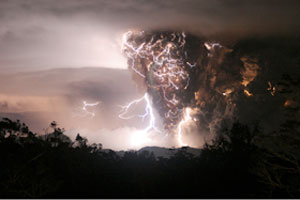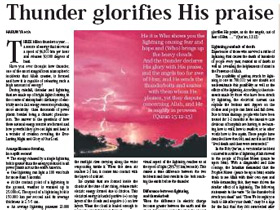
Three billion thunders a year…
 A source of energy that moves at a speed of 96.000 km per hour and releases 30.000 degrees of heat.
A source of energy that moves at a speed of 96.000 km per hour and releases 30.000 degrees of heat.
Have you ever thought how thunder, one of the most magnificent atmospheric incidents that Allah creates, is formed and how it is capable of releasing such a high amount of energy?
During rainfall, thunder and lightning that are made up of bright lights forming in the course of atmospheric discharge of electricity are in fact energy resources producing more electricity than thousands of power plants; besides being a climatic phenomenon. The answer to the questions of how these natural energy sources are formed and how powerful they give out light and heat is a wonder of creation revealing the Ever-Lasting Might and Glory of Our Lord.
A magnificence forming in a split second: Miracle of Lightning
• The energy released by a single lightning bolt is greater than the energy produced in all power plants across the entire America.
• One lightning can light a 100 watt bulb for more than 3 months.
• At the contact point of a lightning to the ground, weather is warmed up to 25.000oC. The speed of a lightning bolt is 150.000 km per second and its average thickness is 2.5-5 cm.
• Lightning produces nitrogen molecules that are essential for the vegetation covering our Earth to sustain its life.
• An average lightning possesses 20.000 ampere of electric power. A welder uses only 250-400 ampere to weld steel.
• Lightning moves at a speed of 150.000 km per second, that is almost at half of the speed of light and it is 100.000 times faster than sound.
Light released by one lightning is greater than that of 10 million 100-watt light bulbs. That is to say; if every house in Istanbul had a light a bulb on, illumination from a single lightning bolt would be greater. Allah announces this glamorous flash of lightning as: “…The brightness of His lightning almost blinds the sight..” (Surat An-Nur, 43)
How is lightning formed?
Air, warmed by the sunlight rises carrying along the water evaporating inside it. When this risen air reaches 2-3 km, it comes into contact with the layers of cold air.
Ice crystals that are formed inside the clouds at the time of air rising, release static electric energy formed due to friction. This electrical energy is loaded positive (+) on top layers of the clouds and negative (-) on low layers. When the cloud is loaded enough to ionize the air; lightning is formed.
Why does it thunder?
Lightning heats the air nearby up to 30.000 degrees Celsius in one millionth of a second. The air warmed up dilates. And it propagates sound waves much faster than the speed of sound; with a pressure 100 times greater than the normal atmospheric pressure. Similar to the airplanes crossing the speed of sound, this causes an explosion sound in the air. And this is named as thunder.
Why does not the light and sound of thunder reach the earth simultaneously?
This is because the sound of thunder reaches us at the speed of sound (340 m/seconds in air); whereas the visual aspect of the lightning reaches us at the speed of light (299.793 km/seconds). This causes a time difference between the two incidents and thus results in the bolt reaching the earth before the thunder.
What is the difference between lightning and thunderbolt?
When the difference in electric charge becomes greater between the earth and the cloud, it becomes easier for air to be pierced and from earth to the cloud; electrical discharge starts through the conductor duct formed by the pierced air. The electrical discharge from the clouds is called lightning and the electrical discharge from the earth back to the cloud is called thunderbolt or return stroke.
The fact of lightning declared in the Holy Quran
Surah Ar-Ra’d is one of the chapters in the Quran and it means “The Thunder”.
Allah announces that the thunder formed by the lightening repeats His praises:
“The thunder glorifies His praise, as do the angels, out of fear of Him. …” (Surah Ar-Ra’d, 13)
Strike of lightning reminds us of death
Experiences of those who survived a strike of lightning that causes the death of hundreds of people every year, remind us of death as well as revealing the helplessness of man in the Presence of Allah. The possibility of getting struck by lightning is one in 700,000; yet one should not underestimate this possibility as well as the effects of the lightning. According to the statements made by those who have been struck by lightning, the electrical current can explode the buttons and zippers on the clothes and people can faint and fall down. Due to brain damage, people who have been treated for 1-2 months at the intensive care divisions of hospitals are having to re-learning how to walk, how to swallow, or in other words how to live again. These people have described how they felt, and say it is as if they “lived death and then were resurrected.”
The possibility of getting struck by lightning is one in 700,000; yet one should not underestimate this possibility as well as the effects of the lightning. According to the statements made by those who have been struck by lightning, the electrical current can explode the buttons and zippers on the clothes and people can faint and fall down. Due to brain damage, people who have been treated for 1-2 months at the intensive care divisions of hospitals are having to re-learning how to walk, how to swallow, or in other words how to live again. These people have described how they felt, and say it is as if they “lived death and then were resurrected.”
In the Holy Quran, a very similar incident occurred in a strike of lightning Allah showed to the people of Prophet Moses (as). With a disgraceful and false courage, the Israelites demanded that the Prophet Moses (as) enable them to see Allah with their own eyes and while demanding this, they were shown the similar effect of a lightning. The following statements in the verse “So the thunder-bolt struck you dead” and “Then We brought you back to life after your death,” may be a sign for the fact that they felt resurrected after their heart stop related to the shock as well as the loss of consciousness and loss of memory they experienced. (Allah knows the best). Here are the related verses in the Quran:
And when you said, ‘Moses, we will not believe in you until we see Allah with our own eyes.’ So the thunder-bolt struck you dead while you were looking. Then We brought you back to life after your death, so that perhaps you would show thanks. (Surat al-Baqara, 55-56)
Adnan Oktar's piece on Arab News:
http://www.arabnews.com/islam-perspective/news/730311


